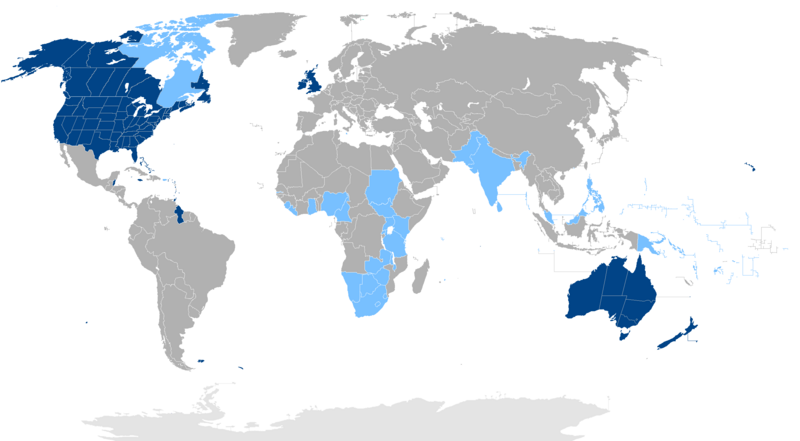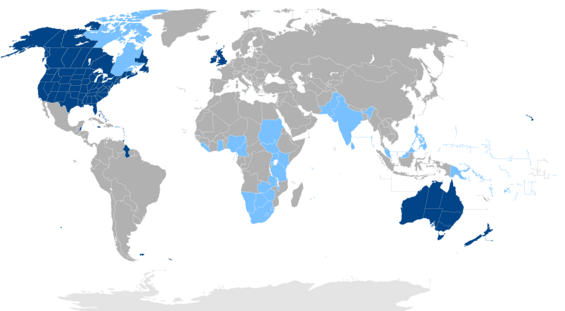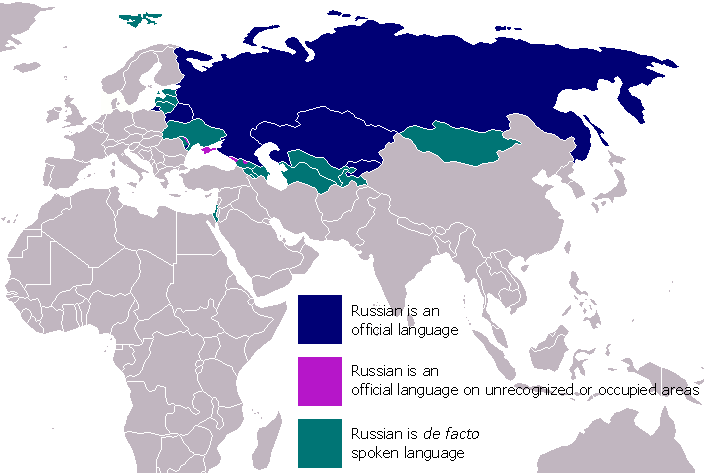File talk:Anglospeak.png
Keeping this version is important[edit]
It is very important to keep this 800 pixel version, for the image map coordinates refer to 800 pixels, and will not work using another version of this image. The unpleasant efect of using the original version image:Anglospeak.png - even sized to 800 px! - is that the clickable areas will slip away from their adequate locations:
| Wrong image used: Clickable areas not at their adequate locations! |
|---|
<imagemap>Image:Anglospeak.png|800px|
|
 |
It does not matter what size the image map will be displayed (scaled) (|800px|>, |125px|>, |565px|>, etc.), for all coordinates in the image map are specified relative to the source image, examples:
| Correct usage, scaled to 125px |
|---|
<imagemap>Image:Anglospeak(800px).png|125px|
|
 |
| Correct usage, scaled to 565 px |
|---|
<imagemap>Image:Anglospeak(800px).png|565px|
|
 |
With kind regards, --Paunaro 23:32, 25 November 2007 (UTC)
Quebec is NOT a country[edit]
This image is supposed to be COUNTRIES with a majority english speaking populations. Although I agree that the Majority of Quebec speaks French (I know as I live in Quebec) it does not change the fact Canada as a whole should be represented and as such, the majority of CANADA are enligsh speakers.
In a few years when California become majority Hispanic will it be coloured differently as well?
DIFFERENT USER
As in Québec French is the exclusive official language, the map does well by pointing out the difference. English is just not official there, so it should stay as it is. Should California ever decide to adopt Spanish as a sole official language, it will be couloured differently, yes ;p
Greetings/cordialement/schöne Grüße
English is not official per se, in Québec, but as part of Canada which has English as one of her official languages it should be included in the lighter shade of blue. This both highlights the official use of English in Canada yet respecting the importance and volume of French speakers in Québec.
Regarding the title of this page, yes Quebec is not a country in the international sense, yet, coming from the United Kingdom myself being made of countries and identities beyond the four former nations or territories people seem to obsess about, I see how in the eyes of many and rightfully Québec is considered a nation in its own right (which the canadian government has recognised). --Lemonade100 (talk) 22:49, 22 November 2011 (UTC)
- But there is no doubt Quebec is part of Canada. This has been confirmed repeatedly in referenda on the subject by its people. This project has clear ideas of what constitutes a country and again Quebec fails. This is broken down by country so we respect those interpretations. If there is no desire to fix this I will nom for deletion as fundamentally pointy and biased. 3142 (talk) 14:35, 10 September 2016 (UTC)
South Africa[edit]
SA should not be coloured dark blue, since its native English-speakers are only a small minority.--Hooiwind (talk) 09:39, 15 April 2009 (UTC)
Singapore[edit]
What about Singapore? Official language is English.
Madagascar[edit]
Madagascar has stopped its short period during which also English was official last year already. So it must be removed from there on the map.
Considerations[edit]
Considerations:
- Create a shade of blue that represents: "Countries/regions in which the mother tongue of the majority of the population is an English-based creole language but the main language of governance is English"
- Use the color purple that shows the countries/regions where there is a small English-creole speaking ethnic minority in a country that may or may not use standard English as the language of government.
- Another shade of blue should refer to the countries in which there is a widely spoken Anglo-creole language in the nation/region although non of official languages are English.
- Use the color shown below (used to indicate where Russian is spoken) to show countries/regions in which one of the official languages is English but also has the presence of an English-based creole spoken as a lingua franca in informal situations by people who may also be well educated in formal English.
- Don't forget to use a green square to show cities/settlements/regions where Englsih is a prominent minority language.
- Use dots to show countries to small to see, e.g. Caribbean, Southeast Asia.
- P.S. Don't forget about shading Quebec the right shade.
`
Here are their uses:
- English-based creole languages:
- Jamaica, Sierra Leone, Belize, the Bahamas, Turks and Caicos Islands, the Virgin Island, Anguilla, Antigua and Barbuda, Montserrat, Saint Kitts and Nevis, Barbados, Grenada, Guyana, Trinidad and Tobago, Cayman Islands, Saint Vincent and the Grenadines, Vantu, Torres Strait Islands, the Solomon Islands, and Papua New Guinea are all the countries/dependencies/regions where an Anglo-creole language is the native tongue/lingua franca of the majority population while standard English is the language of government.
- Limonese, Miskito Coast Creole, Colón Creole, Rama Cay Creole, Bay Islands Creole, Bocas del Toro Creole, Bende, Samaná English, Afro-Seminole Creole, Gullah, Aluku, Ndyuka, Paramaccan, Kwinti, Saramaccan, and Aku are all English-based creole languages spoken by a small ethnic minority in a region/country that does not speak their language.
- They are spoken in: the eastern coast of Honduras, Nicaragua, Costa Rica, and Panama roughly stretching from the Caratasca Lagoon in Honduras to the Bocas del Toro Archipelago in Panama; the Bay Islands off the coast of Honduras; the Colombian-controlled Archipelago of San Andrés off the coast of Nicaragua; the Samaná Peninsula in the Dominican Republic; very small, scattered communities in the northeastern Florida wilderness; the South Carolina Lowcountry and the Sea Islands in coastal South Carolina and Georgia; small settlements near the national border in the Maripasoula region of French Guiana; a small community in the interior wilderness of the Marowijne District in Suriname; a small cluster of settlements at the bank of the Coppename River; eastern Suriname wilderness; around the Saramacca River and Suriname River with some populations in French Guiana; an in The Gambia.
- The islands of Saba, Saint Martin, & Sint Eustatius under Dutch & French control, Sranan Tongo in Suriname; and the the Fernandino languages on Bioko Island are all the regions in which the majority of the population speaks an English-based creole language but does not have English as the official language.
- Nigeria, Liberia, Cameroon, Philippines, Singapore, and Malaysia are all countries in which English is not the native tongue but a English-based creole has reached the status of lingua franca in informal settings. Standard English is still used as lingua franca in formal settings.
- Refer to this list to get ideas about how to show small countries/regions.
Legend[edit]
|
Countries/dependencies where English has official language status and/or is the main mother tongue.
Countries/dependencies where the mother tongue is an English-based Creole but the main language of government is formal English.
Countries/dependencies in which there is a widely spoken Anglo-creole language in the nation/region although non of official languages are English.
Countries where English is official but is not a widely-spoken language.
Countries in which English is not the native tongue but a English-based creole has reached the status of lingua franca in informal settings. Standard English is still used as lingua franca in formal settings as it is also the official language.
English-based creole languages unique to a small ethnic minority.
Cities/settlements where English is a major minority language and/or has a notable presence large presence.
|
ThisguyYEAH (talk) 02:19, 3 September 2011 (UTC)
Netherlands[edit]
Are you sure that English is an official language in the Netherlands? --ALE! ¿…? 17:04, 21 November 2012 (UTC)
- No, it is absolutely not. This is just Anglo-hedonistic fuss which you'll find elsewhere as well if you look around a little bit. To be removed from that map (just as Québec must be made light blue) at once. 217.81.129.70 18:30, 16 December 2012 (UTC)
- Neither is the case with Malaysia...
- At least in Malaysia it seems to have some kind of status, according to the country's wikipedia article, but surely not in the Netherlands. --MrTweek (talk) 00:43, 10 January 2013 (UTC)
- Actually, on Saba and Sint Eustatius, both public bodies in the Netherlands (proper), English is an official language. Not in the European part of the country, though. Richard 12:22, 7 January 2019 (UTC)
- At least in Malaysia it seems to have some kind of status, according to the country's wikipedia article, but surely not in the Netherlands. --MrTweek (talk) 00:43, 10 January 2013 (UTC)
- Neither is the case with Malaysia...
Belice[edit]
(Map)Hobbyist,
Turn pro and remove Belize again (that is, put it back in light blue). Don't say your changing the scale and then secretly change country colors for no reason/without discussion/without any sources. Thanks, 2.243.75.119 08:49, 7 May 2015 (UTC)
- Done. Corrected Belize to light blue (which I overlooked while uploading and which was incorrectly colored in dark blue), where English is an official language, but not the majority language. Thank you for alerting me. --Maphobbyist (talk) 12:47, 10 June 2015 (UTC)
[edit]
Everyone is fixating on Quebec, but English is also not the native language of the majority of people in Nunavut. If Quebec is shaded light blue, Nunavut should be shaded light blue as well. — Preceding unsigned comment was added by 2601:602:8701:b3c0:80dd:cb1:56e7:aa8f (talk)
- Good point, I corrected Nunavut. Thanks. Rob984 (talk) 11:07, 7 November 2017 (UTC)
?!?[edit]
Can someone please revert to the last version before 4 January? Where the hell is this getting? Ridiculousness? Like it is the every day language in Austria, or the traditionally anglophone country of Greece etc...let alone sources for this nonsense (there are none). As far as I remember it is still Wiki- not Trumppedia here 85.246.33.91 01:17, 6 January 2018 (UTC)
Antarctica[edit]
The Anglophone countries of the world have possessions in uninhabited Antarctica, so shouldn't they be counted as Anglophone? PrussianOwl (talk) 08:00, 26 March 2018 (UTC)
- Hmmm... you call it uninhabited. What language do people speak in a part of the world where no people live? Richard 06:30, 2 October 2018 (UTC)
- I mean, they have no permanent settlement, but I think it seems reasonable to group them when the administering country is officially English-speaking. PrussianOwl (talk) 21:38, 13 December 2018 (UTC)
- Since it's neither a state nor a country, I would keep Antarctica blank. If you really feel the need to add some blue there, consider bringing this under wider attention and see how other people think about it. Should a majority agree to have the file changed, there could be some other points of possible improvement. For instance: why should the state borders within the US be drawn? Similar borders exist elsewhere (Brazil, Germany, the UK) without being put in the map. Richard 07:54, 17 December 2018 (UTC)
- Right, that seems fair. I don't see the reason why either. PrussianOwl (talk) 23:53, 3 January 2019 (UTC)
- Since it's neither a state nor a country, I would keep Antarctica blank. If you really feel the need to add some blue there, consider bringing this under wider attention and see how other people think about it. Should a majority agree to have the file changed, there could be some other points of possible improvement. For instance: why should the state borders within the US be drawn? Similar borders exist elsewhere (Brazil, Germany, the UK) without being put in the map. Richard 07:54, 17 December 2018 (UTC)
- I mean, they have no permanent settlement, but I think it seems reasonable to group them when the administering country is officially English-speaking. PrussianOwl (talk) 21:38, 13 December 2018 (UTC)
Definition of dark blue[edit]
Since in many of the dark blue countries, English is not spoken by a majority, I've changed the legend to 'English or an English creole'. In Belize, English, Creole and Spanish are spoken by comparable numbers. In Jamaica and Guyana, more speak Creole ('Patois') than English. Etc. Kwamikagami (talk) 20:58, 23 July 2019 (UTC)
We need to be careful of Ethnologue figures. They will cite Crystal (2003) for "English", and then some other source for Creole, which actually refers to the same thing, doubling the estimated population of English/Creole speakers. For instance, in 2003 Guyana had a pop of 680k, of which Crystal said 650k were L1 English speakers and 30k were L2 speakers. Ethn. lists these numbers alongside 650k for Creole speakers -- that is, that there are twice as many English/Creole speakers in the country as there are people in the country.
Re. the recent change of Sierra Leone and Liberia to dark blue, according to Jacques Leclerc at CEFAN,[1], 2½% are native speakers of 'Liberian English', quite far from a majority. Ethn. doesn't give any L1 figure at all. And if we're going to color a country dark blue because the majority of the population are L2 speakers, then we need to make all NW Europe dark blue. Kwamikagami (talk) 20:29, 16 August 2019 (UTC)
